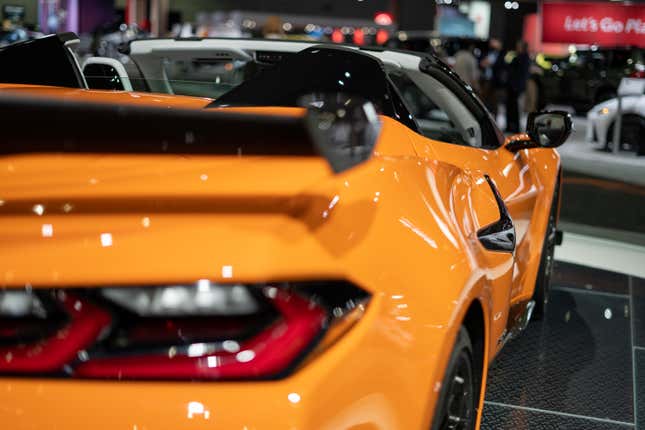
It’s no secret that modern cars rely on electronics to do pretty much everything, and the C8 Corvette is no exception. An electrical fault could cost you rear visibility if it takes out the backwards-facing camera, or turn an electronically-actuated convertible roof into an impromptu fixed hardtop. Despite that, you’d expect the hard structures of the car, things like glass and metal, to be immune to such modern annoyances. Well, the Corvette is here to shatter your expectations once again.
According to a new technical bulletin from General Motors, aftermarket radar detectors hard-wired to the car behind the rear-view mirror can affect how voltage flows elsewhere in the car — specifically, to the side-view mirrors. This increased voltage can permanently dim the mirror, and cause its face to fill with a frustrating Nazca line pattern.

The issue specifically appears to affect the car’s “X1 connector”, an electrical connector that’s tucked away behind the mirror. It seems that this jumper can somehow over-volt the side mirrors, though how exactly this happens isn’t described in the service bulletin. The solution, however, is: Unplug your radar detector and replace the mirror, and do it all outside the warranty’s coverage.
Interestingly, the service bulletin (and a related forum post on the topic) specifically mention radar detectors — and only radar detectors. And the location of the harness in question looks prime to tap into for other hardwire needs, like a dashcam, but those are never brought up.
Maybe C8 owners aren’t installing dashcams due to the car’s built-in array of cameras, or maybe radar detectors just get installed first. With a car that quick, I can understand those priorities.
GM’s service bulletin doesn’t mention any sort of preventative maintenance from the company, so it’s unclear if this is an issue that could be fixed via a dealer update. As a possible at-home solution, a smart enough controller board could likely regulate the amount of voltage going towards each mirror, but it all depends on how the system is wired — an odd factor to have to consider for a mirror.
